by Heather Kent | Jun 24, 2016
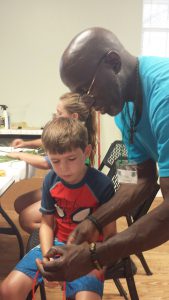
Nate Grimsley is known for teaching crafts at 4-H camp each year.
In a world where so many things don’t make sense, Nate Grimsley has discovered something that does. Ten years ago, Nate’s daughter won 1st place at the Leon County 4-H Tropicana Public Speaking Program and was awarded a full scholarship to Camp Cherry Lake. Nate had attended camp at Cherry Lake as a camper decades earlier and after being asked 9 years ago by 4-H agent Marcus Boston to consider attending camp as a volunteer he said “Yes!” and has never looked back. Today, Nate still serves as a chaperone for camp, but he also teaches art and crafts classes during the week. He has taught hundreds of youth how to make paracord bracelets and to weave fans and insect models out of native palmetto leaves. He is so good at his volunteer role that he is often asked to volunteer at other county camp weeks and even the State Shooting Sports Camp.
“Volunteering is rewarding- I love teaching and it is so fulfilling to give back and to set a positive example for kids. I had a learning disability when I was growing up, so I have a different perspective on how kids learn. I have one rule- they are never allowed to say ‘I can’t.’ They can say they don’t understand, but never ‘I can’t’. It is so rewarding to see them succeed.”
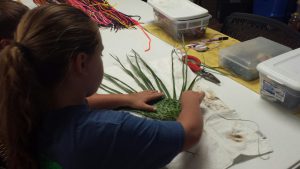
Nate teaches youth to use palmetto branches to weave fans, baskets and even 3-dimensional insect models.
Nate’s example has had a huge impact on his own children. Both of his children served as teen leaders for 4-H. His son’s cabin always won “cleanest cabin” and his daughter was such a good counselor that he was invited to intern at a camp in Maine. “The leadership skills that my kids learned at camp helped both of them land their first jobs. It is a great program and parents and teens should take advantage of it.” Marcus Boston and Stefanie Prevatt, 4-H faculty at the Leon County UF/IFAS Extension Office, have developed a strenuous but highly effective camp counselor leadership program. Even though it is a volunteer position, teens must complete an application, screening, interview and 30-hour training program in order to serve.
Even though Nate’s kids have graduated out of the 4-H program, he continues to serve. In addition to being a certified chaperone, he is also certified to teach archery through the 4-H Shooting Sports program. Erlier this year, he taught workshops for teens at adults at the Northwest Teen Retreat and 4-H State Volunteer Leader’s Forum.
“I am still involved because I just love kids and I love seeing them learn. I have always volunteered in different ways- school boosters, organized sports, but I love volunteering in 4-H so much that my wife and I are starting a 4-H club this fall- the ‘Good Sense 4-H Club.’ Our goal is to help kids learn how to problem solve and make good decisions now and later in life.”
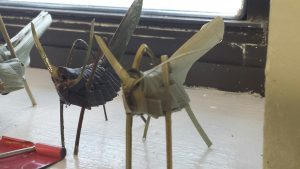
Nate’s palmetto-leaf grasshoppers are a popular camp craft and are extremely realistic looking.
Nate encourages everyone he knows to volunteer. He holds down a full-time job, but has always been able to work with his supervisor to make time for volunteering. “Being a volunteer is a great means of networking. I have met so many interesting people through my volunteer work. I find joy in giving back to others. God has given so much to me- I want to pay it forward. Also, we need solid role models to teach kids how to be independent. 4-H is a great way to do just that.”
4-H offers a wide range of volunteer positions to fit various schedules, interests and abilities. To find out more about volunteering and what is available in your community, contact your local UF IFAS County Extension Office or visit http://florida4h.org/volunteers.
by ewestbrook | Feb 26, 2016
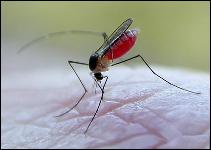 It’s February in Florida and as the weather gets warmer we Floridians start to turn our attention to the thousands of outdoor activities our beautiful state has to offer. Florida is not just known for its natural beauty, it is also known for it abundance of mosquitoes. With the mosquito transmitted Zika virus making headline news and the tell tale itchy red bites popping up on our unprotected skin you may be wondering what you can do to protect your family in the coming months. Millions of dollars are spent in Florida every year to combat mosquitoes. Municipalities will often spray for mosquitoes and use larvacides in wetland areas to control the pests. You can make a big difference in the effort to combat the blood-sucking parasites and prevent disease transmission by following the five d’s of mosquito control and prevention.
It’s February in Florida and as the weather gets warmer we Floridians start to turn our attention to the thousands of outdoor activities our beautiful state has to offer. Florida is not just known for its natural beauty, it is also known for it abundance of mosquitoes. With the mosquito transmitted Zika virus making headline news and the tell tale itchy red bites popping up on our unprotected skin you may be wondering what you can do to protect your family in the coming months. Millions of dollars are spent in Florida every year to combat mosquitoes. Municipalities will often spray for mosquitoes and use larvacides in wetland areas to control the pests. You can make a big difference in the effort to combat the blood-sucking parasites and prevent disease transmission by following the five d’s of mosquito control and prevention.
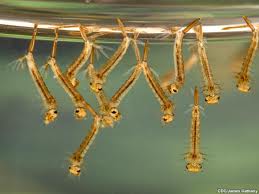
Larval mosquitoes in a pool of water
- Dump- Mosquitos spend the beginning of their lives developing in aquatic environments and they don’t mind small spaces. By periodically dumping standing water you can prevent them from growing into adults that feed on you. Standing water in old tires, plant containers, buckets and any other containers with standing water all provide a great environment for many species of mosquitoes to develop. By being vigilant in dumping these containers you are doing a lot to control mosquito populations.
- Drain– Kiddy pools, water troughs, pet water dishes and birdbaths all provide an ideal environment for mosquito larva to grow. You can prevent this by regularly draining and refilling these water sources.
- Dress– When you are dressing to go outdoors in the warmer months in Florida prepare for mosquitoes. Wear clothing that covers as much skin as possible to prevent bites. Long pants and long sleeve shirts made out of lighter materials like linen are ideal in our hot summer climate when venturing into the great outdoors. Also consider hats with mosquito netting
- DEET- Use an insect repellent that lists DEET or alternatively eucalyptus oil to prevent mosquito bites. DEET is proven to be the most effective repellent and safe for human use. Bug zappers, candles and ultra- sonic devices are not effective mosquito control measures. Save your money and invest in proven solutions like DEET based insect repellents.
- Dusk/Dawn- Mosquitoes are most active during the early morning and evening hours. Try to stay indoors during these time periods and if that is not possible make sure you are dressed to prevent mosquito bites and using DEET based insect repellent.
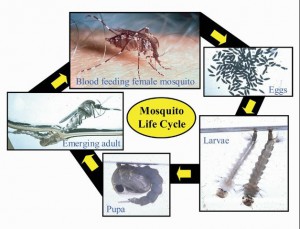
The mosquito lifecycle
For more information on mosquitoes in Florida call you county UF|IFAS Extension Office or county health department and check out these in-depth articles on the subject:
http://mosquito.ifas.ufl.edu/Fact_Sheets.htm
https://edis.ifas.ufl.edu/in851
http://edis.ifas.ufl.edu/in652
Do you have a love for the outdoors? Would you like to share your passion for the environment with the next generation of Florida citizens? If so, consider becoming a 4-H volunteer. Florida 4-H offers a range of opportunities for volunteers to teach youth about natural resources, shooting sports, and water conservation (just to name a few). For more information about becoming a 4-H volunteer, visit your local UF IFAS County Extension office or http://florida4h.org/volunteers.
by Jenny Savely | Feb 19, 2016

By 2050, the United Nations estimates that the total population will total around 9 billion people globally (United Nations: 2004). Meeting the challenge of addressing the needs of so many people is an opportunity for growth that can be gained through scientific developments and personal responsibility, areas in which 4-H eagerly works to educate youth and adults.
We learn that our everyday behaviors, even if they seem very small, can actually put a lot of strain on our environment when so many people do the same things.
We often ask our youth, “If everyone were to do the same things you do every day, what would that look like? What kind of impact do you think it would have?”.
We know that much of our daily energy use, like the amount of water we use, how much trash we produce, the kind of food we buy and where we buy it, and how much energy we use in our transportation, for example, can make a big difference if we all make decisions that keep our environment in mind.
We can help prevent environmental damage that leads to climate change and human illness by conserving energy and making a smaller ecological footprint. An ecological footprint is the amount of resources from the environment that are required to meet the demands of our everyday consumption of goods. 4-H encourages youth to make thoughtful decisions about their behaviors such as:
- Eating locally grown and in season produce
- Using reusable bags for shopping
- Buying products with less packaging and that are less processed
- Turning lights off when they aren’t in use
- Doing outdoor rather than indoor activities
- Walking, biking, carpooling, or taking public transportation
- Recycling
- Conserving water when brushing teeth and by displacing water in toilet tanks
- Only running washing machines with full loads
However, motivating people to change their behaviors can be difficult. In 4-H we work to encourage young people to understand at an early age the enormous impact they have on the health and well-being of others. The World Health Organization tells us that “…environmental factors are a root cause of a significant burden of death, disease and disability – particularly in developing (poor) countries. The resulting impacts are estimated to cause about 25% of death and disease globally, reaching nearly 35% in regions such as sub-Saharan Africa.” (World Health Organization: 2016). A good portion of environmental damage that affects us in negative ways is caused by our using more resources than our planet has the ability to renew at the same rate we use them and by extracting our resources in harmful ways. This may seem overwhelming, but there are actually very simple things that each of us can do that can significantly help lessen the impact. Actually, when we change our behavior is western countries like the United States, we can make more significant differences since we are one of the primary consumers of energy in the world.
And as always, youth learn not only by DOING but by helping to teach others! We encourage our youth to educate their friends and family as well as to mentor younger 4-H’ers in project areas like environmental science. If your youth or club is interested in learning more about energy conservation and environmental science projects, there are an array of wonderful resources, listed below, to help get you started. Your county 4-H agent is happy to help any youth or volunteer interested in this or any one of the project areas that help provide youth with research based education.
Games: http://www.energystar.gov/index.cfm?c=kids.kids_index
Curriculum: http://www.chesapeakebay.net/channel_files/18256/handout_-_4-h_environmental_curriculum.pdf
http://www.need.org/files/curriculum/guides/Saving%20Energy%20Student%20Guide.pdf
Resources for teachers: http://www.eia.gov/kids/energy.cfm?page=6
http://www.eia.gov/kids/energy.cfm?page=1
http://coseenow.net/antarctica/
United Nations. 2004. “World Population to 2300”. United Nations Department of Economic and Social Affairs: Population Division. United Nations: New York, NY.
World Health Organization: The Health and Environment Linkages Initiative (HELI). 2016. “Environment and Health in Developing Countries”. URL http://www.who.int/heli/risks/ehindevcoun/en/index1.html. Accessed February 5, 2016.
Photo: Wake County, North Carolina 4-H. http://www.wakegov.com/humanservices/family/4h/traditional/Pages/default.aspx
by pmdavis | Feb 5, 2016
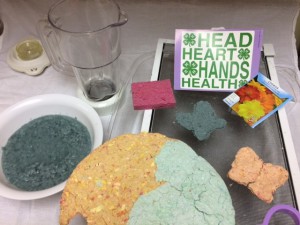
Grow Card Supplies and products
4-H literally got its start with gardening. The very first 4-H Clubs focused on growing tomatoes and corn for boys and canning for girls. Many youth and volunteers still enjoy gardening projects today. One great curricula that is used is the Junior Master Gardening Program. This program allows youth to enhance their life using gardening as the spark of interest. Gardening enriches youth’s lives, promotes good health, gives a sense of environmental awareness and saves money.
One of the activities I enjoy doing with youth combines gardening with recycling and crafting. As a group we will make our own paper grow cards or ornaments that have seeds embedded in them. Once the cards are dry, we deliver them as a service project. The cards are fun and inexpensive to make and are a perfect activity for your next club meeting! Try making them as valentines for Valentines Day. For beginners, we recommend growing tomatoes, lettuce, peppers, cucumbers, basil, chives, or parsley. Not into vegies? Try starting marigolds, cosmos, sunflowers, zinnias, pansies, or petunias.
Download our detailed factsheet with photos and directions. This activity is great for any occasion when you need a card or small gift. You can use as party favors by making them into ornaments using raffia to hang them from a tree or gift bag. You can take them to a nursing home, veterans center, hospital or other site as a service project for your club. Just be sure to share with the individual that they need to plant your card or ornament. It is a great way to help youth share their joy of gardening with others.
Other Extension gardening resources include:
• Florida Vegetable Gardening Guide
If you have a green thumb, consider going “totally green” as a 4-H gardening volunteer! 4-H needs caring adults like you to share their knowledge and passion for gardening with the next generation. Through the 4-H gardening project, youth not only learn gardening knowledge and skills, they also learn responsibility, teamwork, and other life skills that will help them grow up to be compassionate and competent citizens. To get involved, contact your local UF IFAS Extension Office, or visit Florida 4-H.
by Julie Pigott Dillard | Jul 24, 2015
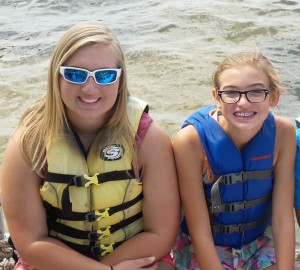
Do you know how to properly fit a life jacket? Photo credit Washington County Extension.
Like Dr. Seuss said, “It’s fun to have fun, but you have to know how.” With over 11,000 miles of rivers, streams and waterways, 4,136 miles of beaches, coastlines, and shorelines, and 4,308 square miles of total water area, Floridians can enjoy time on the water year-round. Whether you’re out cruising the river, fishing for Red Snapper in the gulf or wakeboarding on a spring-fed lake, you should be thinking about water safety.
The number one rule in boating and water sports safety is to wear a life jacket. According to safetykids.org, 77% of fatal boating accidents were drowning victims, and 84% of those victims weren’t wearing life jackets. Florida law states that all children six years of age and under must wear a life jacket, but all youth can benefit from wearing a properly sized, snug fitting U.S. Coast Guard approved life jacket to ensure safety in and around water and while boating.
You might think that life jackets are useful only in rough conditions, but one-half of all water related fatalities happen in calm waters. So, when would a life jacket save lives?
- When a boat has capsized in rough water.
- When a boat sinks in heavy sea conditions.
- When a person is thrown from a boat after a collision.
- When an injury occurs.
- When a person is tossed into freezing water.
- When a person is thrown off balance and into the water fishing.
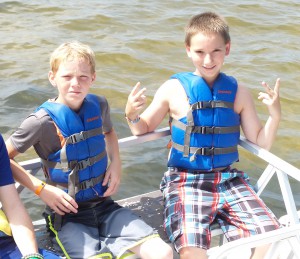
According to Florida law, youth ages 6 and under must wear a life jacket, but everyone can benefit from wearing one. Photo credit Washington County Extension.
- When a carbon monoxide fumes cause unconsciousness.
- When a person is unable to swim because of heavy, waterlogged clothing.
To ensure you have a properly fitting life jacket:
- Choose a life jacket for your size and weight.
- Correctly fasten all straps and buckles.
- Hold your arms up in the touchdown pose.
- Ask someone to gently pull up on the tops of the arm openings.
- Check there is no excess room above the arm opening and to make sure the jacket doesn’t ride up over your chin or face.
Remember, fun items like pool noodles, floats and water wings should never be substituted for a well-fitting life jacket. Consider a life jacket like any other piece of sporting equipment that requires maintenance. Check it yearly for wear and tear and for buoyancy, and throw away leaky, faded, waterlogged and misshapen life jackets. Football players wear helmets, drivers and car riders wear seat belts – responsible boaters should wear life jackets.
If you have a passion for fishing or boating, consider becoming a 4-H Sports fishing project leader. We have some wonderful curriculum and resources for volunteers who would like to share their fishing expertise with youth. To find out more, contact your local UF IFAS Extension Office, or visit http://florida4h.org/volunteers.
Your opinion matters! Take this short survey to help us improve our blog: https://ufl.qualtrics.com/SE/?SID=SV_3gtLKjqia3F75QN
by hdbignell | Jun 12, 2015
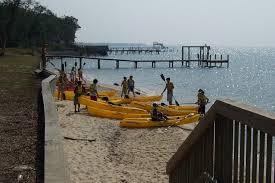
Photo credit UF IFAS Washington County
School is out and the summer is quickly approaching. As a kid, this was my favorite time of the year because in a few weeks I would be off to summer camp. I was always excited about summer camp because it was a time to make new friends while participating in my favorite outdoor activities. Going to sleep away camp gave me a sense of independence and allowed me to learn and make decisions on my own. What classes did I want to take? What activities did I want to participate in? This was something I had to decide on my own without my parents input.
4-H summer camp is the perfect opportunity to learn, make friends, disconnect from electronics, and enjoy the outdoors! Camp Cherry Lake and Camp Timpoochee give youth the opportunity to learn while having fun in a safe environment.
Preparing for camp can be physical and mental, not only on the camper, but on the parent as well. It is completely normal to be nervous before a week of sleep away camp. One of the biggest issues campers deal with is homesickness. There will be many trained adults and teen counselors who will be around the entire week of camp that will make sure that the campers are learning and having a great time, but here are some proactive things you can do with your child in preparation for camp:
- Have a sleepover at a relative’s house for the weekend.
- When physically packing, make sure your camper is involved. This can help prevent homesickness as well as making them aware of what they have with them. When packing for camp, make a list so that nothing is forgotten.
- Try avoid making deals with your child (If you are homesick, I will come pick you up early).
- The American Camping Association has some great online reources for preventing homesickness.
For more information about 4-H summer camp opportunities for youth and teen and adult volunteers, contact your local UF IFAS Extension Office.
Your opinion matters! Please provide feedback on this short survey to help us improve our blog:https://ufl.qualtrics.com/SE/?SID=SV_3gtLKjqia3F75QN.











